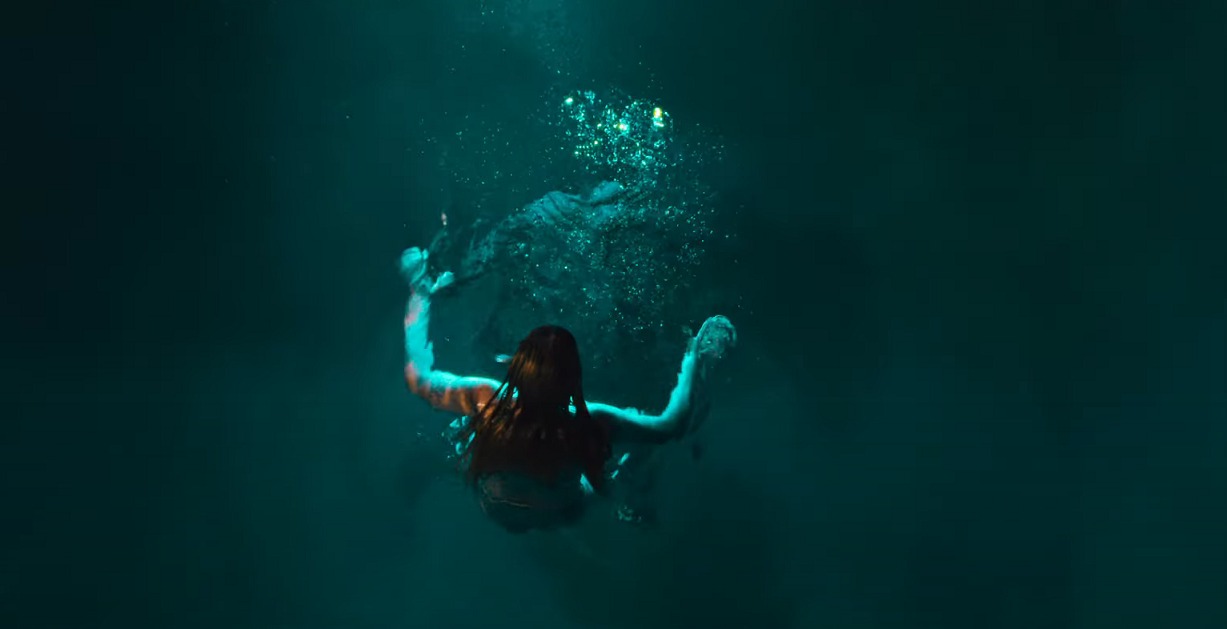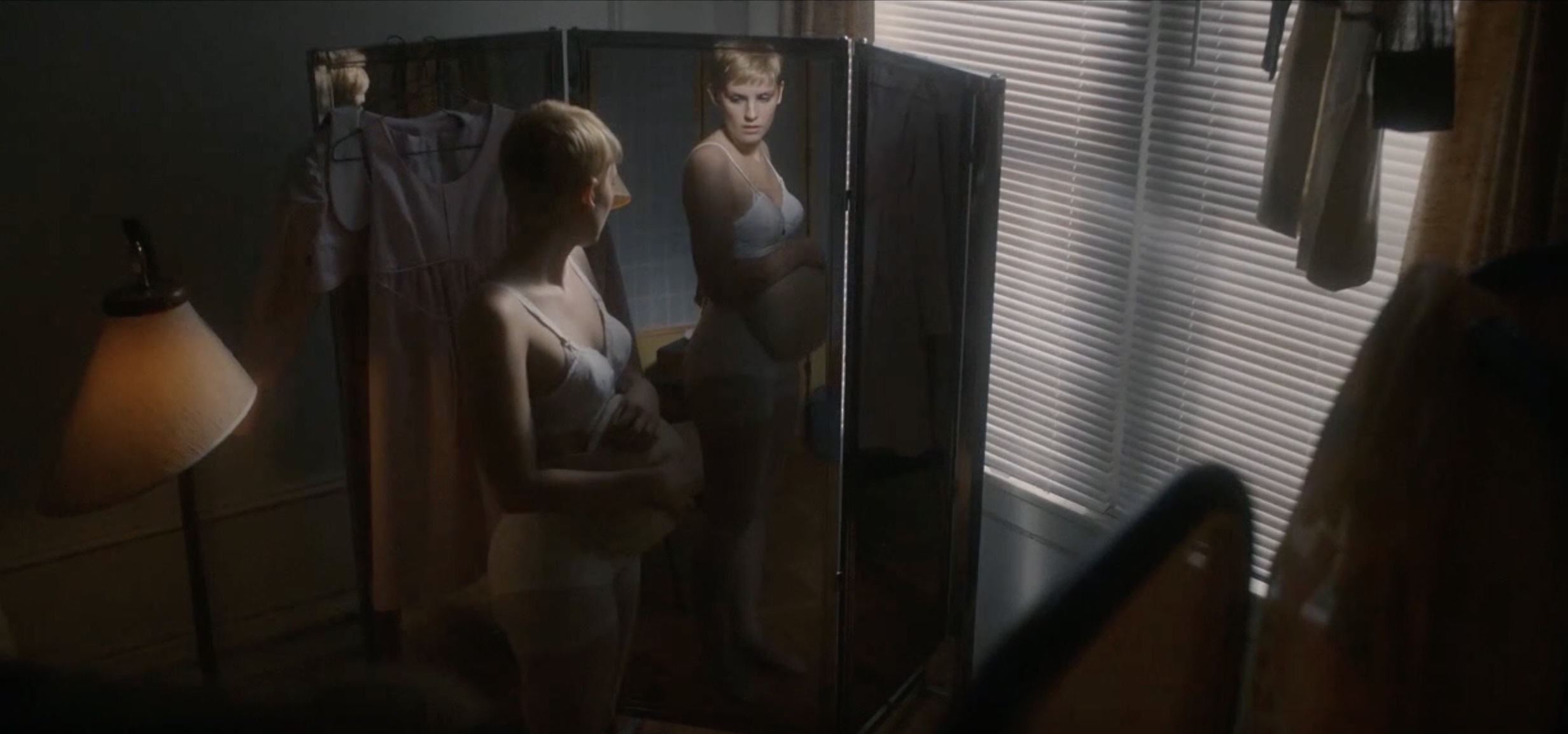Reviews
‘Night Swim’ Review – High Concept Swimming Pool Horror Movie Struggles to Stay Afloat

Expanding a horror short to feature length is tricky work, particularly when the short in question gets straight to the scares. Writer/Director Bryce McGuire’s 2014 short Night Swim, a collaboration with Rod Blackhurst, cut straight to the horror to exploit everyone’s worst fears about swimming pools. Almost a full decade later, McGuire’s feature expansion showcases more ways to mine terror from the aquatic concept, buoyed by a great cast, but a familiar formula and simplified mythology threaten to sink it all.
After a cold open demonstrates the dangers of the film’s haunted location, a seemingly benign anywhere America backyard pool, Night Swim introduces the ill-fated family destined to discover the supernatural treachery awaiting them. The Waller family are at the beginning of a new chapter in their lives; a recent degenerative illness diagnosis cut a professional baseball career short for dad Ray Waller (Wyatt Russell). As Ray struggles with not just his functional health but concepts of identity without his beloved sport, it’s up to his wife Eve (Kerry Condon) to care for him and, frequently, act as the bridge between dad and children Izzy (Amélie Hoeferle) and Elliot (Gavin Warren). Eve’s years of sacrifice to Ray’s career continue when they purchase a home with a pool ideal for Ray’s physical therapy. Only the Wallers’ dreams of a better life get derailed by supernatural occurrences that mean the family harm.

(from lower left) Izzy Waller (Amélie Hoeferle), Elliot Waller (Gavin Warren), Kay (Nancy Lenehan), Ray Waller (Wyatt Russell) and Eve Waller (Kerry Condon) in Night Swim, directed by Bryce McGuire. © 2023 Universal Studios. All Rights Reserved.
It’s the family dynamics and the great cast that mostly keep McGuire’s feature afloat. Russell’s natural affability creates an easy foothold into the Waller family’s plight, with his illness putting more weight on Eve’s shoulders. Younger sibling Elliot desperately wants to make his athlete dad proud, but his interests and lack of coordination mean he struggles to connect. That doesn’t just contribute to the emotional stakes, but it’s a key relationship that underscores Eve’s keen talent for observation.
Condon leans into Eve’s maternal instincts, ensuring a savvy horror heroine who makes smart choices at every turn. When the haunted swimming pool begins its machinations in earnest, Eve is the first to get suspicious. McGuire’s script ensures that it’s the sinister force at play that thwarts Eve’s attempts to protect her family and never a contrived character choice solely to propel the narrative forward. Thanks to Condon’s nuanced performance, Night Swim quickly becomes her movie.
Night Swim is also helped by cinematographer Charlie Sarroff (Relic, Smile), who captures the central antagonist- the pool- with a stunning clarity that makes the underwater sequences pop. As McGuire mines every facet, drain, and depth for the horror, it’s made more tactile by a commitment to practical effects. Fractured FX ensures that the ghosts that pop up to torment isolated swimmers are bloated and unsettling. Night Swim soars when it plunges its protagonists into inky black depths to confront unknown, impossible horrors.

Kerry Condon as Eve Waller in Night Swim, directed by Bryce McGuire.
Where it flounders is in the mythology and story itself. A strong concept gets Night Swim off to a solid start, supported by characters with rooting interest, but it quickly devolves into a series of haunted house tropes that recall more classic entries. The more Ray channels his inner George Lutz or Jack Torrance, the more contrived the high concept effort becomes. Or rather, more predictable. The explanation behind the pool’s paranormal activity also feels under-baked and underwhelming to the point of undermining what works. That McGuire gets a bit too conservative with the horror encounters and body count leaves the flaws more exposed.
Night Swim will likely work better as an entry point into the genre for newcomers unfamiliar with more prominent haunted house horror movies like The Amityville Horror or The Shining. Condon’s fierce yet heartfelt performance and the underwater sequences keep Night Swim treading water. Still, the high concept novelty of a haunted swimming pool will wear out its welcome quickly for seasoned horror fans who’ve seen this scenario play out so many times before.
Night Swim releases in theaters on January 5, 2024.


Reviews
“AHS: Delicate” Review – “Little Gold Man” Mixes Oscar Fever & Baby Fever into the Perfect Product

‘AHS: Delicate’ enters early labor with a fun, frenzied episode that finds the perfect tone and goes for broke as its water breaks.
“I’ll figure it out. Women always do.”
American Horror Story is no stranger to remixing real-life history with ludicrous, heightened Murphy-isms, whether it’s AHS: 1984’s incorporation of Richard Ramirez, AHS: Cult’s use of Valerie Solanas, or AHS: Coven’s prominent role for the Axeman of New Orleans. Accordingly, it’s very much par for the course for AHS: Delicate to riff on other pop culture touchstones and infinitely warp them to its wicked whims. That being said, it takes real guts to do a postmodern feminist version of Rosemary’s Baby and then actually put Mia Farrow – while she’s filming Rosemary’s Baby, no less – into the narrative. This is the type of gonzo bullshit that I want out of American Horror Story! Sharon Tate even shows up for a minute because why the hell not? Make no mistake, this is completely absurd, but the right kind of campy absurdity that’s consistently been in American Horror Story’s wheelhouse since its inception. It’s a wild introduction that sets up an Oscar-centric AHS: Delicate episode for success. “Little Gold Man” is a chaotic episode that’s worth its weight in gold and starts to bring this contentious season home.
It’d be one thing if “Little Gold Man” just featured a brief detour to 1967 so that this season of pregnancy horror could cross off Rosemary’s Baby from its checklist. AHS: Delicate gets more ambitious with its revisionist history and goes so far as to say that Mia Farrow and Anna Victoria Alcott are similarly plagued. “Little Gold Man” intentionally gives Frank Sinatra dialogue that’s basically verbatim from Dex Harding Sr., which indicates that this demonic curse has been ruffling Hollywood’s feathers for the better part of a century. Anna Victoria Alcott’s Oscar-nominated feature film, The Auteur, is evidently no different than Rosemary’s Baby. It’s merely Satanic forces’ latest attempt to cultivate the “perfect product.” “Little Gold Man” even implies that the only reason that Mia Farrow didn’t go on to make waves at the 1969 Academy Awards and ends up with her twisted lot in life is because she couldn’t properly commit to Siobhan’s scheme, unlike Anna.
This is easily one of American Horror Story’s more ridiculous cold opens, but there’s a lot of love for the horror genre and Hollywood that pumps through its veins. If Hollywood needs to be a part of AHS: Delicate’s story then this is actually the perfect connective tissue. On that note, Claire DeJean plays Sharon Tate in “Little Gold Man” and does fine work with the brief scene. However, it would have been a nice, subtle nod of continuity if AHS: Delicate brought back Rachel Roberts who previously portrayed Tate in AHS: Cult. “Little Gold Man” still makes its point and to echo a famous line from Jennifer Lynch’s father’s television masterpiece: “It is happening again.”
“Little Gold Man” is rich in sequences where Anna just rides the waves of success and enjoys her blossoming fame. She feels empowered and begins to finally take control of her life, rather than let it push her around and get under her skin like a gestating fetus. Anna’s success coincides with a colossal exposition dump from Tavi Gevinson’s Cora, a character who’s been absent for so long that we were all seemingly meant to forget that she was ever someone who was supposed to be significant. Cora has apparently been the one pulling many of Anna’s strings all along as she goes Single White Female, rather than Anna having a case of Repulsion. It’s an explanation that oddly works and feeds into the episode’s more general message of dreams becoming nightmares. Cora continuing to stay aligned with Dr. Hill because she has student loans is also somehow, tragically the perfect explanation for her abhorrent behavior. It’s not the most outlandish series of events in an episode that also briefly gives Anna alligator legs and makes Emma Roberts and Kim Kardashian kiss.

“Little Gold Man” often feels like it hits the fast-forward button as it delivers more answers, much in the same vein as last week’s “Ava Hestia.” These episodes are two sides of the same coin and it’s surely no coincidence that they’re both directed by Jennifer Lynch. This season has benefitted from being entirely written by Halley Feiffer – a first for the series – but it’s unfortunate that Lynch couldn’t direct every episode of AHS: Delicate instead of just four out of nine entries. That’s not to say that a version of this season that was unilaterally directed by Lynch would have been without its issues. However, it’s likely that there’d be a better sense of synergy across the season with fewer redundancies. She’s responsible for the best episodes of AHS: Delicate and it’s a disappointment that she won’t be the one who closes the season out in next week’s finale.
To this point, “Little Gold Man” utilizes immaculate pacing that helps this episode breeze by. Anna’s Oscar nomination and the awards ceremony are in the same episode, whereas it feels like “Part 1” of the season would have spaced these events out over four or five episodes. This frenzied tempo works in “Little Gold Man’s” favor as AHS: Delicate speed-runs to its finish instead of getting lost in laborious plotting and unnecessary storytelling. This is how the entire season should have been. Although it’s also worth pointing out that this is by far the shortest episode of American Horror Story to date at only 34 minutes. It’s a shame that the season’s strongest entries have also been the ones with the least amount of content. There could have been a whole other act to “Little Gold Man,” or at the least, a substantially longer cold open that got more out of its Mia Farrow mayhem.
“Little Gold Man” is an American Horror Story episode that does everything right, but is still forced to contend with three-quarters of a subpar season. “Part 2” of AHS: Delicate actually helps the season’s first five episodes shine brighter in retrospect and this will definitely be a season that benefits from one long binge that doesn’t have a six-month break in the middle. Unfortunately, anyone who’s already watched it once will likely not feel compelled to experience these labor pains a second time over. With one episode to go and Anna’s potential demon offspring ready to greet the world, AHS: Delicate is poised to deliver one hell of a finale.
Although, to paraphrase Frank Sinatra, “How do you expect to be a good conclusion if this is what you’re chasing?”













You must be logged in to post a comment.